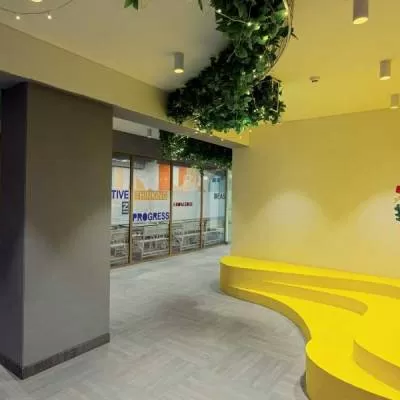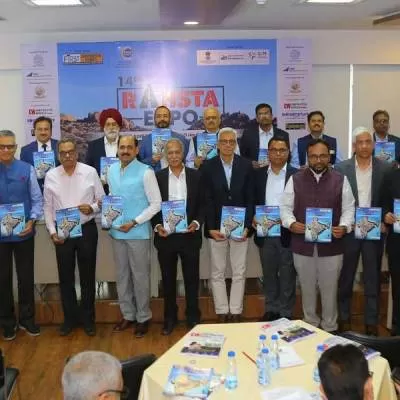- Home
- Real Estate
- One new Swedish company comes to India every month

One new Swedish company comes to India every month
At present, there are over 170 Swedish JVs or wholly owned subsidiaries in India. Swedish companies like SKF, Atlas Copco, Volvo and ABB are established entities that are steadily expanding their footprint in India. And, for Sweden, over 40 major or small Indian IT companies have their representative offices in the country. Also, joint research has been emerging as an area with great potential for bilateral collaboration, particularly in green technology. With so much happening, it is no surprise that a decision was finally taken to establish the Consulate General of Sweden in India in September 2012. "For Swedish companies, India is important - especially Maharashtra and Gujarat," says Fredrika Ornbrant, Consul General, Consulate General of Sweden. While she agrees that there are many questions and a huge curiosity about India in Sweden, she touches upon existing opportunities in both countries with a special emphasis on smart cities in conversation with SHRIYAL SETHUMADHAVAN.
What emphasis does Sweden place on India as a trade partner?
Figures can be interpreted in different ways. But trade over time has increased. The beauty of trade between India and Sweden is that Swedish companies come to India with a long-term perspective. One new Swedish company comes to India every month. And if you look at the figures from 2005 to today, the number of Swedish companies in India has doubled. Today, over 160-170 Swedish companies are doing jobs in India.
What is the current nature of engagement between Sweden and India? Which areas would you say are the most attractive in the construction sector?
This depends on whether you are looking at it from a government or business perspective. From a government perspective, Sweden and India have formed one MoU in the area of science and technology and another one in energy. This can be used as a basis for further collaboration between both countries. Also, discussions are on in areas of mutual interests including urban development. Seen from a business perspective, Swedish companies are experts in integrated traffic control systems (Synsys traffic), airport systems (Safegate) and port lightening (Nordic light) and system integration in general. Moreover, companies like Gunnebo are involved in system integration, Volvo and Scania provide high-technology construction equipment and Sandvik and Atlas Copco are high-end suppliers in their respective niche.
What potential do you see in India for smart grids and renewables?
The potential is huge. Smart grids are certainly a requirement across the country. It is a huge business and Swedish companies can contribute with suitable solutions for India.
A lot of Indian companies big and small are setting up facilities in Sweden in the IT space...
In terms of IT consultancy services, Indian companies like Wipro, Infosys and Cognizant are doing big jobs in Sweden. These are important players and it is good that they are in the Swedish market. They are well-managed and highly professional and, in a way, increase competition in the market. Apart from IT, when we talk of opportunities, the Swedish Government launched a package a couple of years ago to invest more in the infrastructure space including railways, roads and ports. Plans have been laid to upgrade systems in these along with projects at the regional level. This can be a great opportunity for Indian companies. Also, when it comes to highways, the western link for example, they could collaborate with Swedish companies or try to bag tenders themselves. Hence, there is scope for a lot more collaboration between Swedish and Indian companies, especially in the infrastructure and transportation sector.
Which cities or states do you find more attractive for investments in IT and R&D in India?
I am always biased towards Mumbai. But, according to statistics, Bengaluru is the main hub when it comes to IT and R&D offshore work. Mumbai and Chennai are also important cities and Hyderabad is definitely picking up.
An area that is witnessing some movement is joint research between India and Sweden. Your views on it.
Sweden is good at innovating and has a strong link to academia. That said; there are a number of small companies in the country, also in the cleantech sphere that are looking forward to collaborating with larger businesses. So this is one way for Indian businesses to benefit from R&D in Sweden: joining hands with companies with a close link to academia.
The Indian Government is aiming for at least two smart cities in each of its states in India. What can Swedish companies offer to India here?
Gujarat has a vision and it is fascinating to see the number of smart cities, ports and airports that the state wants to create. There are similar ambitions for Maharashtra. What we can offer from the Swedish side is an integrated and holistic approach to smart cities. Fifty to a hundred years ago, Sweden was not a clean country environmentally owing to industrialisation. Further in the 1970s, a movement was created, which grew stronger in the 80s, to try and get a more clean and sustainable environment and society. Today, through smart and sustainable cities, what we refer to as æSymbiocitiesÆ, we are trying to integrate different aspects of a city - energy accessibility, waste management, public transportations, etc - to make it a pleasant place to live in without leaving scars for climate change. We have a good experience in Symbiocities, where municipalities and companies work together, but one has to be there from the initial planning or else, like in the case of a road, it might be difficult to rethink. Swedish companies excel in integrated approaches and have the required expertise in areas such as municipal waste handling and sorting, and a clean and sustainable transportation system.
What are the current challenges in the bilateral relationship between both countries?
We need to create awareness about our respective countries. We can gain a lot by learning from each other. India has become increasingly important to Sweden and Swedish companies. That is why we opened the Consulate General in Mumbai.
Vital Facts!
- Important import countries for Sweden: India ranks 29
- Important import countries for India: Sweden ranks 40
- As on 2012, trade figures between both countries stood at $2.5 billion.
- Today, over 160-170 Swedish companies are doing jobs in India.
- Over 40 major or small Indian IT companies have their representative offices in Sweden.
To share your views on India-Sweden relations, write in at feedback@ASAPPmedia.com
Fredrika Ornbrant, Consul General, Consulate General of Sweden At present, there are over 170 Swedish JVs or wholly owned subsidiaries in India. Swedish companies like SKF, Atlas Copco, Volvo and ABB are established entities that are steadily expanding their footprint in India. And, for Sweden, over 40 major or small Indian IT companies have their representative offices in the country. Also, joint research has been emerging as an area with great potential for bilateral collaboration, particularly in green technology. With so much happening, it is no surprise that a decision was finally taken to establish the Consulate General of Sweden in India in September 2012. "For Swedish companies, India is important - especially Maharashtra and Gujarat," says Fredrika Ornbrant, Consul General, Consulate General of Sweden. While she agrees that there are many questions and a huge curiosity about India in Sweden, she touches upon existing opportunities in both countries with a special emphasis on smart cities in conversation with SHRIYAL SETHUMADHAVAN. What emphasis does Sweden place on India as a trade partner? Figures can be interpreted in different ways. But trade over time has increased. The beauty of trade between India and Sweden is that Swedish companies come to India with a long-term perspective. One new Swedish company comes to India every month. And if you look at the figures from 2005 to today, the number of Swedish companies in India has doubled. Today, over 160-170 Swedish companies are doing jobs in India. What is the current nature of engagement between Sweden and India? Which areas would you say are the most attractive in the construction sector? This depends on whether you are looking at it from a government or business perspective. From a government perspective, Sweden and India have formed one MoU in the area of science and technology and another one in energy. This can be used as a basis for further collaboration between both countries. Also, discussions are on in areas of mutual interests including urban development. Seen from a business perspective, Swedish companies are experts in integrated traffic control systems (Synsys traffic), airport systems (Safegate) and port lightening (Nordic light) and system integration in general. Moreover, companies like Gunnebo are involved in system integration, Volvo and Scania provide high-technology construction equipment and Sandvik and Atlas Copco are high-end suppliers in their respective niche. What potential do you see in India for smart grids and renewables? The potential is huge. Smart grids are certainly a requirement across the country. It is a huge business and Swedish companies can contribute with suitable solutions for India. A lot of Indian companies big and small are setting up facilities in Sweden in the IT space... In terms of IT consultancy services, Indian companies like Wipro, Infosys and Cognizant are doing big jobs in Sweden. These are important players and it is good that they are in the Swedish market. They are well-managed and highly professional and, in a way, increase competition in the market. Apart from IT, when we talk of opportunities, the Swedish Government launched a package a couple of years ago to invest more in the infrastructure space including railways, roads and ports. Plans have been laid to upgrade systems in these along with projects at the regional level. This can be a great opportunity for Indian companies. Also, when it comes to highways, the western link for example, they could collaborate with Swedish companies or try to bag tenders themselves. Hence, there is scope for a lot more collaboration between Swedish and Indian companies, especially in the infrastructure and transportation sector. Which cities or states do you find more attractive for investments in IT and R&D in India? I am always biased towards Mumbai. But, according to statistics, Bengaluru is the main hub when it comes to IT and R&D offshore work. Mumbai and Chennai are also important cities and Hyderabad is definitely picking up. An area that is witnessing some movement is joint research between India and Sweden. Your views on it. Sweden is good at innovating and has a strong link to academia. That said; there are a number of small companies in the country, also in the cleantech sphere that are looking forward to collaborating with larger businesses. So this is one way for Indian businesses to benefit from R&D in Sweden: joining hands with companies with a close link to academia. The Indian Government is aiming for at least two smart cities in each of its states in India. What can Swedish companies offer to India here? Gujarat has a vision and it is fascinating to see the number of smart cities, ports and airports that the state wants to create. There are similar ambitions for Maharashtra. What we can offer from the Swedish side is an integrated and holistic approach to smart cities. Fifty to a hundred years ago, Sweden was not a clean country environmentally owing to industrialisation. Further in the 1970s, a movement was created, which grew stronger in the 80s, to try and get a more clean and sustainable environment and society. Today, through smart and sustainable cities, what we refer to as æSymbiocitiesÆ, we are trying to integrate different aspects of a city - energy accessibility, waste management, public transportations, etc - to make it a pleasant place to live in without leaving scars for climate change. We have a good experience in Symbiocities, where municipalities and companies work together, but one has to be there from the initial planning or else, like in the case of a road, it might be difficult to rethink. Swedish companies excel in integrated approaches and have the required expertise in areas such as municipal waste handling and sorting, and a clean and sustainable transportation system. What are the current challenges in the bilateral relationship between both countries? We need to create awareness about our respective countries. We can gain a lot by learning from each other. India has become increasingly important to Sweden and Swedish companies. That is why we opened the Consulate General in Mumbai. Vital Facts! Important import countries for Sweden: India ranks 29 Important import countries for India: Sweden ranks 40 As on 2012, trade figures between both countries stood at $2.5 billion. Today, over 160-170 Swedish companies are doing jobs in India. Over 40 major or small Indian IT companies have their representative offices in Sweden. To share your views on India-Sweden relations, write in at feedback@ASAPPmedia.com






















